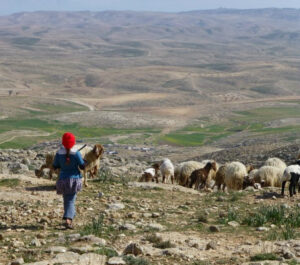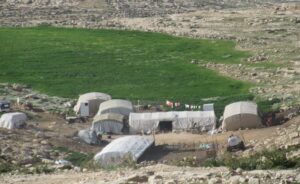Gwithian Doswell
Ecumenical Accompanier 2013 and 2015
As Quakers, we have longstanding testimonies to peace and equality. We understand that all human beings are equal before God. If we do not treat each other as equals, there can be no true peace in the world.
For many decades now, this understanding of the testimonies has translated into Quaker support for the United Nations organisation and for international law. Both provide frameworks and methods for resolving conflicts between peoples which do not rely on the use of armed force.
‘Quakers in Britain’ support and manage the UK and Ireland section of the Ecumenical Accompaniment Programme in Palestine and Israel (EAPPI) as part of our peace witness. A commitment to international humanitarian law and human rights law as well as non-violence is central to the programme.
With recent reports from Amnesty International and Human Rights Watch highlighting the huge disparity in terms of basic rights afforded to Palestinians and to Jewish Israelis in Israel and the occupied Palestinian territories, it is clear that the two populations are not being treated as people of equal worth by the Israeli authorities. Neither is there peace.
The little girl in the photo is a child of Masafer Yatta, a semi-desert area in the south of the Israeli-occupied West Bank. I met her in 2013 as I accompanied her and her friends to school. Their parents and a local UN official, worried about harassment from the Israeli military and armed settlers, called on the local Ecumenical Accompaniers to help.

Families have lived in Masafer Yatta for generations and generations, continuing a long tradition of combining drylands agriculture with sheep and goat herding. The land where they grow their wheat, and the expanse of grazing land adjacent, are both vital for the continued existence of this unique farming lifestyle and these communities. Water is scarce. The animals need a lot of space to roam and find grass to eat. They are sustained by intermittent rain-water cisterns which provide drinking water for the herds and the shepherds themselves.
These are Palestinians living under a harsh Israeli military occupation. I was told by their schoolteacher that almost all the children’s homes – tents or simple breeze block structures – had demolition orders issued against them. The latrines were also condemned, as were the animal pens, solar panels, and the all-important water cisterns. Only some of the caves, converted into homes, were safe from the threat of demolition.
The Israeli military authorities do not issue building permits for Palestinians in Masafer Yatta. They have zoned it for another use: Firing Zone 918, a military training area. They don’t want Palestinians to live here. The grazing and agricultural land used by these shepherds before the creation of the State of Israel is now beyond the border. It is zoned as a nature reserve.

International aid organisations have tried to bring a water supply to Masafer Yatta. The occupation bulldozers destroyed the pipes. Each time the villagers repair the roads between the communities, the Israeli authorities dig them up again. It makes access to health facilities, markets for their sheep and goats, and the transportation of expensive tankered water extremely difficult. For the last ten years, EAPPI observers have continued to witness the demolitions, the restrictions on land use, the violence, and the Palestinians’ steadfastness and determination to stay.
(https://eyewitnessblogs.com)
The schoolteacher says he encourages his pupils to be proud shepherds and proud farmers. Palestine needs shepherds and farmers as well as doctors and lawyers, he says.
In May 2022, after more than 22 years of legal challenges and appeals, the Supreme Court of Israel made a final ruling. The Palestinians living in ‘Firing Zone 918’ can now be forcibly expelled from their homes whenever the occupation authorities decide.
Contrary to international law, the land will not be used for the benefit of the local civilian population. Around 18% of the West Bank is currently zoned for Israeli military exercises and hundreds of Palestinian shepherds and their families are at risk of displacement.
Ma’on, the nearby illegal Israeli settlement and outpost, comprises solid brick houses with red tiled roofs and smart cars in the drives. It is built on Palestinian land and heavily subsidised by the Israeli state. Its existence contravenes international law. According to the 4th Geneva Convention, occupying powers must not settle their own citizens on occupied land. Ma’on is connected to water and electricity supplies. It looks like it will remain, and it is growing.
The residents of Masafer Yatta are very frightened. Settler violence is on the increase, live-fire exercises began last week and the villagers know they can be forcibly expelled from their homes at any time. Israeli human rights and peace activists are standing by them but all say that only international pressure can stop this expulsion. It is very important not to lose hope.
Action can be taken to stop Israel further violating international law. EAPPI UK and Ireland is part of the #SaveMasaferYatta campaign. Go to the website to find out more https://www.eyewitnessblogs.com/take-action/
EAPPI shares eyewitness stories and raises the voices of Palestinians and Israelis working non-violently for peace. Without equality and fairness and an adherence to international law, a just peace for both Palestinians and Israelis cannot be achieved.
| Next Article |
Back to July 2022 Newsletter Main Page
Forty-Three Newsletter • Number 519 • July 2022
Oxford Friends Meeting
43 St Giles, Oxford OX1 3LW
Copyright 2022, Oxford Quakers
